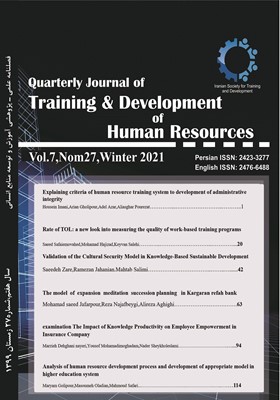تبیین شاخصهای نظام آموزش منابع انسانی در راستای ارتقاء سلامت نظام اداری
الموضوعات :
حسین ایمانی
1
,
آرین قلی پور
2
![]() ,
عادل آذر
3
,
عادل آذر
3
![]() ,
علی اصغر پورعزت
4
,
علی اصغر پورعزت
4
1 - دانشگاه تهران
2 - دانشگاه تهران
3 - دانشگاه تربیت مدرس
4 - دانشگاه تهران
الکلمات المفتاحية: نظام آموزش منابع انسانی, سلامت نظام اداري, فساد اداری, سازمانهای دولتي,
ملخص المقالة :
یکی از مبانی توسعه در هر جامعه ای، نظام اداری و مدیریت آن است. نظام اداری مطلوب و کارآمد میتواند زمینهساز و تسهیلکننده تحقق اهداف برنامه های توسعه قرار گیرد. سازمان سالم، سازمان متشکل از نیروی خلاق، سازنده و متعهد است که از روحیه و عملکرد خوبی برخوردار است و این نیروی خلاق سازمان را قادر می سازد تا به اهداف خود برسد و حتی موجبات رشد و شکوفایی جامعه را فراهم سازد. عوامل متعددی در سالمسازی سازمان مؤثرند که یکی از آنها آموزش جامع کارکنان است. بهدلیل اهمیت و نقشی که نظام آموزش منابع انسانی در ارتقاء سلامت اداری و پیشگیری از فساد اداری دارد، پژوهش حاضر درصدد تبیین شاخصهای نظام آموزش منابع انسانی در راستاي ارتقاء سلامت نظام اداري در سازمانهاي دولتي است. پژوهش حاضر در چارچوب رويكرد كيفي و با استفاده از روش تحليل تم صورت گرفته است و براي استخراج شاخص های نظام آموزش منابع انسانی در راستاي ارتقاء سلامت نظام اداري با متخصصان سازمان اداري و استخدامي كشور با استفاده از شيوه نمونهگيري هدفمند مصاحبه انجام شده است. شاخص های نظام آموزش منابع انسانی در راستاي ارتقاء سلامت نظام اداري در قالب 4 تم اصلي، 13 تم فرعي و 48 مفهوم استخراج شد و یافتهها نشان داد که مؤلفههای سیستم آموزش منابع انسانی در راستای ارتقاء سلامت نظام اداری عبارتند از آموزش تخصص محور، آموزش اخلاق محور، بهبود مستمر و اولویت و استمرار دورههای ارتقاء سلامت اداری.
1. Rabeei; Ali; Bigdeli, Minou (2010). Boosting Administrative Integrity of State and Public Organizations; A Cultural Pathology. Journal of Religion and communication, 39, 187-205.
2. Haan, I., Benner, H., (2008), A Tool to Assess the Integrity of Public Sector Organization. International Journal of Auditing.
3. Ramezani, Mohammad Ali; Ayyoubi, Maryam (2016). Investigating the role and impact of Islamic work ethics on organizational culture and administrative integrity of employees in institute of oil industry . Ethics researches, 2, 103-120.
4. Memarzadeh Tehran, Gholamreza; Najafi, Mahnaz (2018). Identifyinf factors affect development of administrative integrity. Journal of development administration, 30, 41-48.
5. Amiri, Mojtaba; Nargesian, Abbas; Bahri Roudposhti, Elnaz (2016). Evaluation of administrative integrity and corruption in municipality of Tehran. Studies of organizational behavior, 4 (4), 65-96.
6. Sajjadi, Hanieh Sadat; Hallaji, Farshad; Maarouf, Naser (2016). Investigating administrative integrity from viewpoint of employees of educational hospitals of Isfahan. Health based researches, 1 (2), 123-132.
7. Antonakas, N. P., Giokas, A. E., & Konstantopoulos, N. (2013). Corruption in Tax Administration: Interviews with Experts. Procedia-Social and Behavioral Sciences, 73, 581-589.
8. Xu, X. (2016). Corruption and economic growth: an absolute obstacle or some efficient grease? Economic and Political Studies, 4(1), 85-100.
9. De Graaf, G. (2007). Causes of corruption: Towards a contextual theory of corruption. Public Administration Quarterly, 39-86.
10. Misangyi, V. F., Weaver, G. R., & Elms, H. (2008). Ending corruption: The interplay among institutional logics, resources, and institutional entrepreneurs. Academy of Management Review, 33(3), 750-770.
11. Vinayan, J. (2015). Vulnerability of HR Systems and Practices to Corruption: A Review and Research Agenda. Editorial Team, 7(1), 25.
12. Deloitte. (2008). Taking the Reins: HR's opportunity to play a leadership role in governance, risk management and compliance. Midtown: Manhattan: Deloitte Consulting.
13. Soltani, Iraj (2003). A view on the role of human resource development in administrative integrity. Administrative development, 35-36, 95-106.
14. Sullivan, J. D. (2009). The moral compass of companies: Business ethics and corporate governance as anti-corruption tools. Global Corporate Governance Forum.
15. Gholipour, Aryan (2011). Human resource management (concepts, theories and practices). Tehran: SAMT press, first edition.
16. Gans-Morse, J., Borges, M., Makarin, A., Mannah Blankson, T., Nickow, A., & Zhang, D. (2017). Reducing Bureaucratic Corruption: Interdisciplinary Perspectives on What Works.
17. Mohammadpour, Ahmad (2014). Research method; anti method (philosophy and plan in qualitative methodology).Vol 1, Tehran: Jameeshenasa press, second edition.
18. Sekaran, Uma (2011). Research methods in management (trans. by Mohammad Saebi and Mahmoud Shirazi). Tehran: institute of public administration education.
19. kvale, s. (1996). interviews: an introduction to qualitative research interviewing thousand oaks, CA: Sage.
20. Braun, V., & Clarke, V. (2006). Using thematic analysis in psychology. Qualitative research in psychology, 3(2), 77-101.
21. Abbaszadegan, Mohammad; Torkzadeh, Jafar (2001). Need assessment in organizations. Tehran, stock company of Enteshar.
22. Hejazi, Yousef; Pardakhtchi, Mohammad Hassan; Shahpasand, Mohammad Reza (2009). Approaches of professional development of teachers. Tehran, University of Tehran press.
23. Pourkarimi, Javad; Ghazei, Abouzar (2012). Comprehensive training system: A model for professional training in Red Crescent. Journal of Emdad and Nejat , 4 (4), 1-16.
24. Ezzati, Mitra; Youzbashi, Alireza; Shateri, Karim (2016). Evaluation of present condition of training courses and presenting a qualitative model for developing effectiveness of training courses (case study: Tax Administration). Journal of human resource training anf development, 4 (12), 127- 148.
25. Abbink, K. (2004). Staff rotation as an anti-corruption policy: an experimental study. European Journal of Political Economy, 20(4), 887-906.


